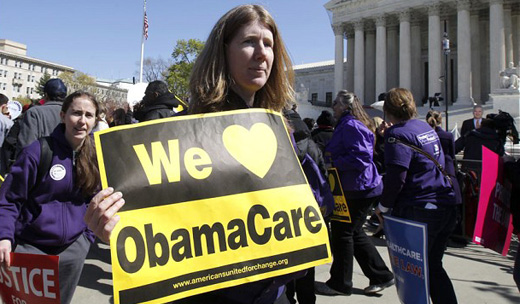
In a historic decision, the U.S. Supreme Court on Thursday upheld virtually all of the Affordable Care Act – the health reform law championed by President Obama to extend health coverage to most uninsured Americans.
The decision stunned many who had predicted since oral arguments in April that the court would strike down a key provision of the law – that the uninsured buy private coverage or pay a penalty on their tax bills. The justices ruled 5-4 that the individual mandate was within Congress’ constitutional authority to levy taxes.
Republicans had aimed their fire at the individual mandate because they knew that without it the entire law would fail. If everyone is not brought into the system, with many who could afford coverage opting out or others buying in only when they get sick, costs for everyone else would be unreasonable high and there would not be enough money in the system to provide coverage for 30 million uninsured people who cannot currently afford any coverage.
The only part of the law that the court took issue with was its provision expanding Medicaid coverage for low-income Americans to an additional 17 million individuals by easing eligibility standards. The justices said states could reject the expansion without forfeiting federal funds for their current Medicaid program.
Chief Justice John Roberts, a member of the court’s conservative bloc, wrote the majority opinion, joined by four more liberal justices. Four dissenting justices said the entire law should be held unconstitutional.
President Obama praised the court’s decision that his signature health care law was constitutional, calling the ruling “a victory for people all over this country.”
“The highest court in the land has spoken. We will continue to implement this law,” he said. “With today’s announcement it is time for us to move forward. To implement and when necessary improve on this law.”
Due to the ongoing campaigns against the law by the insurance industry and Republicans, the fact that the court upheld its constitutionality was as much of a landmark event as the law’s passage in the first place.
Republican presidential candidate Mitt Romney reacted to the ruling with what was viewed as a highly partisan and political statement, promising that “what the Supreme Court did not do on its last day in session, I will do in my first day in office. I will act to repeal Obamacare. Help us defeat Obamacare. Help us defeat the liberal agenda.”
The president, in contrast, used his address to lay out the advantages of the new law for millions of Americans. “It should be pretty clear that I didn’t do this because it is good politics,” Obama said. “I did it because it is good for the country.”
AFL-CIO President Richard Trumka said unions are pleased and relieved that the law was upheld. He described the Affordable Care Act as the “first step in expanding health care coverage, improving care and beginning to get control of health care costs. We will need to build on the achievements of the Act, Medicare and Medicaid,” he said, “in order to fix our broken health care system and advance along a path to a more equitable and cost-effective system.
“A simple indisputably constitutional solution is to allow Americans of all ages to buy into an improved Medicare program,” Trumka added. “We believe every baby in America – whether rich or poor – deserves the same standard of quality care and we will keep moving forward until we make this a reality.”
President Obama signed the Affordable Health Care Act in March 2010 after it passed both houses of Congress following a 10-month legislative battle. Not a single Republican voted for the bill in either house.
The president’s bill became law after more than 60 years of struggle for universal health care had already taken place in the United States. Universal health care is the norm in nearly every other industrialized country while today 50 million Americans remain uninsured.
The law upheld today by the court was not the preferred approach of most progressives who had backed a Medicare-type “single-payer” system of tax-supported federal reimbursement.
A “public option” alternative backed by Obama did not make it into the bill that was passed in 2010. That idea, a government-run insurance plan to compete with private insurers, was beaten down in Congress by the private insurance industry.
While most of the Affordable Health Care Act takes effect in 2014, including a requirement that insurers accept all customers regardless of pre-existing conditions, some provisions are already in effect including one that allows as many as 6 million young adults to remain covered by their parents’ policies until age 26.
The law has also already banned sex discrimination in insurance rates, eliminated lifetime dollar limits on individual insurance benefits, and barred insurers from canceling coverage when a policyholder becomes ill. Other provisions have already expanded Medicare prescription coverage for seniors and provided them with free preventive checkups and services.
Photo: Supporters of “ObamaCare” healthcare reform in front of the Supreme Court building. AP












Comments